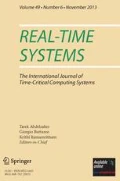Abstract
In real-time computing systems, timing constraints imposed on application tasks are typically guaranteed off line using schedulability tests based on fixed parameters and worst-case execution times. However, a precise estimation of tasks' computation times is very hard to achieve, due to the non-deterministic behavior of several low-level processor mechanisms, such as caching, prefetching, and DMA data transfer. The disadvantage of relying the guarantee test on a priori estimates is that an underestimation of computation times may jeopardize the correct behavior of the system, whereas an overestimation will certainly waste system resources and causes a performance degradation. In this paper, we propose a new methodology for automatically adapting the rates of a periodic task set without forcing the programmer to provide a priori estimates of tasks' computation times. Actual executions are monitored by a runtime mechanism and used as feedback signals for predicting the actual load and achieving rate adaptation. Load balancing is performed using an elastic task model, according to which tasks utilizations are treated as springs with given elastic coefficients.
Similar content being viewed by others
References
Abdelzaher, T. F., Atkins, E. M., and Shin, K. G. 1997. QoS negotiation in real-time systems and its applications to automated flight control. In Proceedings of the IEEE Real-Time Technology and Applications Symposium. Montreal, Canada.
Abeni, L., and Buttazzo, G. 2000. Support for dynamic QoS in the HARTIK kernel. In Proceedings of the 7th IEEE Real-Time Computing Systems and Applications. Cheju Island, South Korea.
Beccari, G., Caselli, S., Reggiani, M., and Zanichelli, F. 1999. Rate modulation of soft real-time tasks in autonomous robot control systems. In IEEE Proceedings of the 11th Euromicro Conference on Real-Time Systems. York.
Buttazzo, G. 1993. HARTIK: A real-time kernel for robotics applications. In Proceedings of the 14th IEEE Real-Time Systems Symposium. Raleigh-Durham, pp. 201-205.
Buttazzo, G., Lipari, G., and Abeni, L. 1998. Elastic task model for adaptive rate control. In Proceedings of the IEEE Real-Time Systems Symposium.
Buttazzo, G., and Abeni, L. 2000. Adaptive rate control through elastic scheduling. In Proceedings of the 39th IEEE Conference on Decision and Control. Sydney, Australia.
Buttazzo, G., Lipari, G., Caccamo, M., and Abeni, L. 2002. Elastic scheduling for flexible workload management. IEEE Transactions on Computers51(3): 289-302.
Fujita, H., Nakajima, T., and Tezuka, H. 1995. A processor reservation system supporting dynamic QOS control. In Second International Workshop on Real-Time Computing Systems and Applications.
Kuo T.-W., and Mok, A. K. 1991. Load adjustment in adaptive real-time systems. In Proceedings of the 12th IEEE Real-Time Systems Symposium.
Lamastra, G., Lipari, G., Buttazzo, G., Casile, A., and Conticelli, F. 1997. HARTIK 3.0: A portable system for developing real-time applications. In Proceedings of the IEEE Real-Time Computing Systems and Applications. Taipei, Taiwan.
Lee, C., Rajkumar, R., and Mercer, C. 1996. Experiences with processor reservation and dynamic QOS in real-time mach. In Proceedings of Multimedia Japan 96.
Lipari, G., Buttazzo, G., and Abeni, L. 1998. A bandwidth reservation algorithm for multi-application systems. In Proceedings of IEEE Real Time Computing Systems and Applications. Hiroshima, Japan.
Liu, C. L., and Layland, J. W. 1973. Scheduling algorithms for multiprogramming in a hard real-time environment. Journal of the ACM20(1): 40-61.
Lu, C., Stankovic, J., Abdelzaher, T., Tao, G., Son, S., and Marley, M. 2000. Performance specifications and metrics for adaptive real-time systems. In Proceedings of the IEEE Real-Time Systems Symposium. Orlando, Florida.
Nakajima, T., and Tezuka, H. 1994. A continuous media application supporting dynamic QOS control on real-time mach. In Proceedings of the ACM Multimedia '94.
Nakajima, T. 1998. Resource reservation for adaptive QOS mapping in real-time mach. In Sixth International Workshop on Parallel and Distributed Real-Time Systems.
Seto, D., Lehoczky, J. P., Sha, L., and Shin, K. G. 1997. On task schedulability in real-time control systems. In Proceedings of the IEEE Real-Time Systems Symposium.
Stankovic, J. A., Lu, C., and Son, S. H. 1998. The case for feedback control in real-time scheduling. In IEEE Proceedings of the Euromicro Conference on Real-Time Systems. York, England.
Lu, C., Stankovic, J. A., Tao, G., and Son, S. H. 1999. Design and evaluation of a feedback control EDF scheduling algorithm. In Proceedings of the 20th IEEE Real-Time Systems Symposium. Phoenix, Arizona.
Author information
Authors and Affiliations
Rights and permissions
About this article
Cite this article
Buttazzo, G., Abeni, L. Adaptive Workload Management through Elastic Scheduling. Real-Time Systems 23, 7–24 (2002). https://doi.org/10.1023/A:1015342318358
Issue Date:
DOI: https://doi.org/10.1023/A:1015342318358




